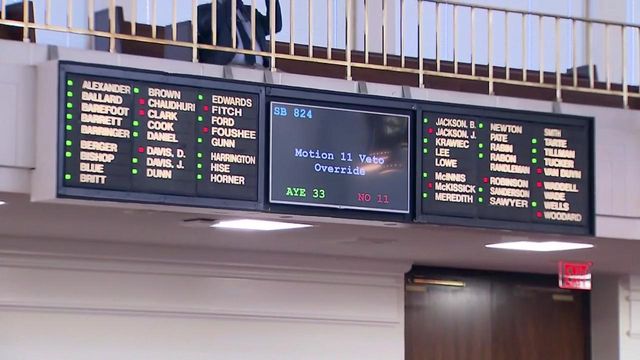Voter ID rules one override vote away from taking effect
The Senate voted 33-12 Tuesday to override Gov. Roy Cooper's veto of legislation to implement the state's new requirement that voters show photo identification at the polls.
Posted — UpdatedThe House is expected to complete the override process on Wednesday, and if that does indeed happen, voters would have to start showing IDs during municipal elections next fall.
Cooper issued his veto last Friday, calling the bill "a solution in search of a problem." He said the whole voter ID effort had "sinister and cynical origins," citing a 2013 state voter ID law that federal courts later threw out after determining it was targeted at suppressing minority voting.
"The cost of disenfranchising those voters or any citizens is too high, and the risk of taking away the fundamental right to vote is too great, for this law to take effect," Cooper said in his veto message.
Republican senators noted Tuesday that voters statewide approved a constitutional amendment last month requiring photo IDs at the polls, and they said they tried to make the new rules easier to meet.
"We don't want anyone to be disenfranchised," said Sen. Joyce Krawiec, R-Forsyth, noting lawmakers adopted more than 30 changes to the bill before it was passed.
Sen. Ben Clark, D-Hoke, who voted for the bill previously, voted against it Tuesday, saying it wasn't "quite ready for prime time."
"Often times when we vote on bills, it's with the expectation that further improvement will take place and that we will eventually get to where we want to be. But unfortunately, I don't believe we're quite there yet," Clark said. "Yes, [voters] voted that they wanted to have a photo ID option as part of the process, but they want to make sure that is done right."
Sen. Terry Van Duyn, D-Buncombe, agreed that the bill doesn't accomplish the promise of the constitutional amendment – to ensure the integrity of elections in North Carolina.
The bill punishes voters because they don't know or can't comply with changing rules and doesn't address the potential of election fraud unrelated to in-person voting, Van Duyn said. Left unsaid was the current state investigation of suspicious absentee voting in the 9th Congressional District election.
Under the proposal, the following IDs would be acceptable at the polls:
- A North Carolina driver's license
- Identification cards for non-drivers issued by the state Division of Motor Vehicles
- U.S. passports
- A county-issued voter ID card
- A tribal enrollment card issued by a federally or state-recognized tribe.
- A student ID card from a University of North Carolina school, a community college or a private university
- An employee identification card issued by a state or local government entity, including a charter school
- A driver's license or ID card issued by another state if the voter's registration came within 90 days of the election
All of those types of ID must be valid and either unexpired or expired for less than a year. Officials at universities, colleges and local government entities would be required to certify every four years that their processes for printing IDs are secure and that they have verified the age and citizenship status of ID holders.
The bill also allows the following forms of ID regardless of whether they carry expiration or issuance dates:
- A military ID issued by the U.S. government
- A veteran's identification card issued by the U.S. Department of Veterans Affairs
- Any of the allowed IDs, even if they're expired, if the voter is at least 65 years old, as long as the ID was unexpired on his or her 65th birthday.
Sen. Joel Ford, D-Mecklenburg, was the only Democrat to support the override.
• Credits
Copyright 2024 by Capitol Broadcasting Company. All rights reserved. This material may not be published, broadcast, rewritten or redistributed.






